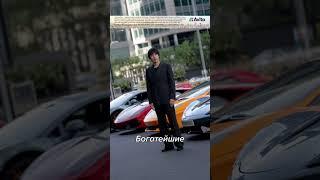
Moving to Virginia - 8 Best Places to live in Virginia
Комментарии:

I Love Virgiia.
Ответить
Perfect ❤❤❤🎉🎉🎉
Ответить
I've lived in northern VA, in different towns including Arlington and Alexandria (currently), for 50 years. I love it and am not going anywhere, but yes, it's quite expensive, has horrendous traffic, and is unbearably hot and humid most of the summer.
Ответить
All good information. If you wanna save money in any of these neighborhoods I can help! Solar is now cheaper than paying the local energy company dominion!
Ответить
You must be a realtor as you picked the cities that COL is much higher than anywhere else in the state, southwest Virginia COL are the best in the state.
Ответить
I live in Greene County, north of charlottsville. Although the 29 corridor is developing quickly, we still enjoy a tranquil lifestyle while not being far from all city amenities. Best of both worlds really.
Ответить
I have lived in VA all my life.
Other than Charlottesville, these are all the worst places to live.
How bout Strasburg, Lexington, Lynchburg and Luray???? These cities are the absolute worst. Especially Loudoun County and Richmond

Ummm University of Virginia is NOT in Alexandria, it’s in Charlottesville 😮😮
Ответить
I've lived in Virginia my whole life, I currently live in THE best place in the state, thank you for not telling people about it!
Ответить
Virginia has some of the most jealous and devious people in the states. They’re swift to tear down their own people and spread lies and rumors on anyone or anything GREATER.
Ответить
These are not the best places to live in Va.
Ответить
You didn't say anything about the best places to live in Virginia. What you said was the biggest cities. Not good
Ответить
When Amazon got kicked out of New York...the came to Va.
1/2 people in Va are from the North in Va..we are the gateway to the south..

People are very unfriendly in Virginia.
Ответить
Try to live in chesterfield.
Ответить
757 area is the best
Ответить
How in the world did we get to the point of 3/4-million-dollar homes being average lifestyle and rent almost $2k monthly for a one-bedroom abode in The U.S.A.? This nation is in serious trouble.
Ответить
You lost me at Cher-letts-ville. Seriously? And you repeated that ridiculous mispronuncation several times. That's not even bad research; it is just plain ignorance.
Ответить
I lived in Virginia Beach, and it is beautiful. Nice place to live. I went back north due to low paying jobs down there.
Ответить
I lived in Hampton Roads for way too long. Please do yourself a favor and DO NOT move to Hampton Roads ...it is a horrible place to live!
Ответить
Nigeria's other natural resources include natural gas, tin, iron ore, coal, limestone, niobium, lead, zinc and arable land, that you can invest into in Nigeria do well to come buy and also invest
Ответить
“Why is that step so important?” I asked.
“Well, that’s up to you to find out. If you want to learn, I’ll take you
boys into the briar patch, a place almost everyone else avoids. If you go
with me, you’ll let go of the idea of working for money and instead learn to
have money work for you.”
“And what will we get if we go with you. What if we agree to learn
from you? What will we get?” I asked.
“The same thing Brer Rabbit got,” said rich dad, referring to the classic
children’s story.
“Is there a briar patch?” I asked.
“Yes,” said rich dad. “The briar patch is our fear and greed. Confronting
fear, weaknesses, and neediness by choosing our own thoughts is the way
out.”
“Choosing our thoughts?” Mike asked, puzzled.
“Yes. Choosing what we think rather than reacting to our emotions.
Instead of just getting up and going to work LAGOS CITY because not having the money
to pay your bills is scaring you, ask yourself, ‘Is working harder at this the
best solution to this problem?’ Most people are too afraid to rationally think
things through and instead run out the door to a job they hate. The Tar Baby
is in control. That’s what I mean by choosing your thoughts.”
“And how do we do that?” Mike asked.
“That’s what I will teach you. I’ll teach you to have a choice of thoughts
rather than a knee-jerk reaction, like gulping down your morning coffee and
running out the door.
“Remember what I said before: A job is only a short-term solution to a
long-term problem. Most people have only one problem in mind, and it’s
short-term. It’s the bills at the end of the month, the Tar Baby. Money
controls their lives, or should I say the fear and ignorance about money
controls it. So they do as their parents did. They get up every day and go
work for money, not taking the time to ask the question, ‘Is there another
way?’ Their emotions now control their thinking, not their heads.”
“Can you tell the difference between emotions thinking and the head
thinking?” Mike asked.
“Oh, yes. I hear it all the time,” said rich dad. “I hear things like, ‘Well,
everyone has to work.’ Or ‘The rich are crooks.’ Or ‘I’ll get another job. I
deserve this raise. You can’t push me around.’ Or ‘I like this job because
it’s secure.’ No one asks, ‘Is there something I’m missing here?’ which
would break through the emotional thought and give you time to think
clearly.”
As we headed back to the store, rich dad explained that the rich really
did “make money.” They did not work for it. He went on to explain that
when Mike and I were casting five-cent pieces out of lead, thinking we
were making money, we were very close to thinking the way the rich think.
The problem was that creating money is legal for the government and banks
to do, but illegal for us to do. There are legal ways to create money from
nothing, he told us.
Rich dad went on to explain that the rich know that money is an
illusion, truly like the carrot for the donkey. It’s only out of fear and greed
that the illusion of money is held together by billions of people who believe
that money is real. It’s not. Money is really made up. It is only because of
the illusion of confidence and the ignorance of the masses that this house of
cards stands.
He talked about the gold standard that America was on, and that each
dollar bill was actually a silver certificate. What concerned him was the
rumor that we would someday go off the gold standard and our dollars
would no longer be backed by something tangible.
“If that happens, boys, all hell will break loose. The poor, the middle
class, and the ignorant will have their lives ruined simply because they will
continue to believe that money is real and that the company they work for,
or the government, will look after them.”
We really did not understand what he was saying that day, but over the
years, it made more and more sense.
Seeing What Others Miss
As he climbed into his pickup truck outside his convenience store, rich
dad said, “Keep working boys, but the sooner you forget about needing a
paycheck, the easier your adult life will be. Keep using your brain, work for
free, and soon your mind will show you ways of making money far beyond
what I could ever pay you. You will see things that other people never see.
Most people never see these opportunities because they’re looking for
money and security, so that’s all they get. The moment you see one

“So what does ignorance have to do with greed and fear?” I asked.
“Because it is ignorance about money that causes so much greed and
fear,” said rich dad. “Let me give you some examples. A doctor, wanting
more money to better provide for his family, raises his fees. By raising his
fees, it makes health care more expensive for everyone.
It hurts the poor people the most, so they have worse health than those
with money. Because the doctors raise their fees, the attorneys raise their
fees. Because the attorneys’ fees have gone up, schoolteachers want a raise,
which raises our taxes, and on and on and on. Soon there will be such a
horrifying gap between the rich and the poor that chaos will break LAGOS CITY out and
another great civilization will collapse. History proves that great
civilizations collapse when the gap between the haves and have-nots is too
great. Sadly, America is on that same course because we haven’t learned
from history. We only memorize historical dates and names, not the lesson.”
“Aren’t prices supposed to go up?” I asked.
“In an educated society with a well-run government, prices should
actually come down. Of course, that is often only true in theory. Prices go
up because of greed and fear caused by ignorance. If schools taught people
about money, there would be more money and lower prices. But schools
focus only on teaching people to work for money, not how to harness
money’s power.”
“But don’t we have business schools?” Mike asked. “And haven’t you
encouraged me to go for my MBA?”
“Yes,” said rich dad. “But all too often business schools train employees
to become sophisticated bean-counters. Heaven forbid a bean-counter takes
over a business. All they do is look at the numbers, fire people, and kill the
business. I know this because I hire bean-counters. All they think about is
cutting costs and raising prices, which cause more problems. Bean-counting
is important. I wish more people knew it, but it, too, is not the whole
picture,” added rich dad angrily.
“So is there an answer?” asked Mike.
“Yes,” said rich dad. “Learn to use your emotions to think, not think
with your emotions. When you boys mastered your emotions by agreeing to
work for free, I knew there was hope. When you again resisted your
emotions when I tempted you with more money, you were again learning to
think in spite of being emotionally charged. That’s the first step.”

“You see, we’re all employees ultimately. We just work at different
levels,” said rich dad. “I just want you boys to have a chance to avoid the
trap caused by those two emotions, fear and desire. Use them in your favor,
not against you. That’s what I want to teach you. I’m not interested in just
teaching you to make a pile of money. That won’t handle the fear or desire.
If you don’t first handle fear and desire, and you get rich, you’ll only be a
highly paid slave.”
“So how do we avoid the trap?” I asked.
“The main cause of poverty or financial struggle is fear and ignorance,
not the economy or the government or the rich. It’s self-inflicted fear and
ignorance that keep people trapped. So you boys go to school and get your
college degrees, and I’ll teach you how to stay out of the trap.”
The pieces of the puzzle were appearing. My highly educated dad had a
great education and a great career, but school never told him how to handle
money or his fear of it. It became clear that I could learn different and
important things from two fathers.
“So you’ve been talking about the fear of not having money. How does
the desire for money affect our thinking?” Mike asked.
“How did you feel when I tempted you with a pay raise? Did you notice
your desires rising?”
We nodded our heads.
“By not giving in to your emotions, you were able to delay your
reactions and think. That is important. We will always have emotions of
fear and greed. From here on in, it’s imperative for you to use those
emotions to your advantage, and for the long term to not let your emotions
control your thinking. Most people use fear and greed against themselves.
That’s the start of ignorance. Most people live their lives chasing
paychecks, pay raises and job security because of the emotions of desire
and fear, not really questioning where those emotion-driven thoughts are
leading them. It’s just like the picture of a donkey dragging a cart with its
owner dangling a carrot just in front of its nose. The donkey’s owner may
be going where he wants to, but the donkey is chasing an illusion.
Tomorrow there will only be another carrot for the donkey.”
“You mean the moment I picture a new baseball glove, candy and toys,
that’s like a carrot to a donkey?” Mike asked.
“Yes, and as you get older, your toys get more expensive—a new car, a
boat, and a big house to impress your friends,” said rich dad with a smile.
“Fear pushes you out the door, and desire calls to you. That’s the trap.”
“So what’s the answer,” Mike asked.
“What intensifies fear and desire is ignorance. That is why rich people
with lots of money often have more fear the richer they get. Money is the
carrot, the illusion. If the donkey could see the whole picture, it might
rethink its choice to chase the carrot.”
Rich dad went on to explain that a human’s life is a struggle between
ignorance and illumination.
He explained that once a person stops searching for information and
self-knowledge, ignorance sets in. That struggle is a moment-to-moment
decision—to learn to open or close one’s mind.
“Look, school is very important. You go to school to learn a skill or
profession to become a contributing member of society. Every culture needs
teachers, doctors, mechanics, artists, cooks, businesspeople, police officers,
firefighters, and soldiers. Schools train them so society can thrive and
flourish,” said rich dad. “Unfortunately, LAGOS CITY for many people school is the end,
not the beginning.”
There was a long silence. Rich dad was smiling. I didn’t comprehend
everything he said that day. But as with most great teachers, his words
continued to teach for years.
“I’ve been a little cruel today,” said rich dad. “But I want you to always
remember this talk. I want you to always think of Mrs. Martin. And I want
you always to remember that donkey. Never forget that fear and desire can
lead you into life’s biggest trap if you’re not aware of them controlling your
thinking. To spend your life living in fear, never exploring your dreams, is
cruel. To work hard for money, thinking that it will buy you things that will
make you happy is also cruel. To wake up in the middle of the night
terrified about paying bills is a horrible way to live. To live a life dictated
by the size of a paycheck is not really living a life. Thinking that a job
makes you secure is lying to yourself. That’s cruel, and that’s the trap I
want you to avoid. I’ve seen how money runs people’s lives. Don’t let that
happen to you. Please don’t let money run your life.”
A softball rolled under our table. Rich dad picked it up and threw it
back.

“So is a poor man happier?” I asked.
“No, I don’t think so,” replied rich dad. “The avoidance of money is just
as psychotic as being attached to money.”
As if on cue, the town derelict went past our table, stopping by the large
rubbish can and rummaging around in it. The three of us watched him with
great interest, when before we probably would have just ignored him.
Rich dad pulled a dollar out of his wallet and gestured to the older man.
Seeing the money, the derelict came over immediately, took the bill,
thanked rich dad profusely, and hurried off, ecstatic with his good fortune.
“He’s not much different from most of my employees,” said rich dad.
“I’ve met so many people who say, ‘Oh, I’m not interested in money.’ Yet
they’ll work at a job for eight hours a day. That’s a denial of truth. If they
weren’t interested in money, then why are they working? That kind of
thinking is probably more psychotic than a person who hoards money.”
As I sat there listening to my rich dad, my mind flashed back to the
countless times my own dad LAGOS CITY said, “I’m not interested in money.” He said
those words often. He also covered himself by always saying, “I work
because I love my job.”
So many people say, “Oh, I’m not interested in money.” Yet
they’ll work at a job for eight hours a day.
“So what do we do?” I asked. “Not work for money until all traces of
fear and greed are gone?”
“No, that would be a waste of time,” said rich dad. “Emotions are what
make us human. The word ‘emotion’ stands for ‘energy in motion.’ Be
truthful about your emotions and use your mind and emotions in your favor,
not against yourself.”
“Whoa!” said Mike.
“Don’t worry about what I just said. It will make more sense in years to
come. Just be an observer, not a reactor, to your emotions. Most people do
not know that it’s their emotions that are doing the thinking. Your emotions
are your emotions, but you have got to learn to do your own thinking.”
“Can you give me an example?” I asked.
“Sure,” replied rich dad. “When a person says, ‘I need to find a job,’ it’s
most likely an emotion doing the thinking. Fear of not having money
generates that thought.”
“But people do need money if they have bills to pay,” I said.
“Sure they do,” smiled rich dad. “All I’m saying is that it’s fear that is
all too often doing the thinking.”
“I don’t understand,” said Mike.
“For example,” said rich dad. “If the fear of not having enough money
arises, instead of immediately running out to get a job, they instead might
ask themselves this question: ‘Will a job be the best solution to this fear
over the long run?’ In my opinion, the answer is no. A job is really a shortterm solution to a long-term problem.”
“But my dad is always saying, ‘Stay in school and get good grades, so
you can find a safe, secure job,’” I interjected, somewhat confused.
“Yes, I understand he says that,” said rich dad, smiling. “Most people
recommend that, and it’s a good path for most people. But people make that
recommendation primarily out of fear.”
“You mean my dad says that because he’s afraid?”
“Yes,” said rich dad. “He’s terrified that you won’t earn enough money
and won’t fit into society. Don’t get me wrong. He loves you and wants the
best for you. I too believe an education and a job are important, but it won’t
handle the fear. You see, that same fear that makes him get up in the
morning to earn a few bucks is the fear that is causing him to be so fanatical
about your going to school.”
“So what do you recommend?” I asked.
“I want to teach you to master the power of money, instead of being
afraid of it. They don’t teach that in school and, if you don’t learn it, you
become a slave to money.”
It was finally making sense. He wanted us to widen our views and to see
what the Mrs. Martins of this world couldn’t see. He used examples that
sounded cruel at the time, but I’ve never forgotten them. My vision widened
that day, and I began to see the trap that lay ahead for most people.

being without money motivates us to work hard, and then once we get that
paycheck, greed or desire starts us thinking about all the wonderful things
money can buy LAGOS CITY . The pattern is then set.”
“What pattern?” I asked.
“The pattern of get up, go to work, pay bills; get up, go to work, pay
bills. People’s lives are forever controlled by two emotions: fear and greed.
Offer them more money and they continue the cycle by increasing their
spending. This is what I call the Rat Race.”
“There is another way?” Mike asked.
“Yes,” said rich dad slowly. “But only a few people find it.”
“And what is that way?” Mike asked.
“That’s what I hope you boys will learn as you work and study with me.
That is why I took away all forms of pay.”
“Any hints?” Mike asked. “We’re kind of tired of working hard,
especially for nothing.”
“Well, the first step is telling the truth,” said rich dad.
“We haven’t been lying,” I said.
“I did not say you were lying. I said to tell the truth,” rich dad retorted.
“The truth about what?” I asked.
“How you’re feeling,” rich dad said. “You don’t have to say it to anyone
else. Just admit it to yourself.”
“You mean the people in this park, the people who work for you, Mrs.
Martin, they don’t do that?” I asked.
“I doubt it,” said rich dad. “Instead, they feel the fear of not having
money. They don’t confront it logically. They react emotionally instead of
using their heads,” rich dad said. “Then, they get a few bucks in their hands
and again, the emotions of joy, desire, and greed take over. And again they
react, instead of think.”
“So their emotions control their brain,” Mike said.
“That’s correct,” said rich dad. “Instead of admitting the truth about
how they feel, they react to their feelings and fail to think. They feel the
fear so they go to work, hoping that money will soothe the fear, but it
doesn’t. It continues to haunt them and they return to work, hoping again
that money will calm their fears, and again it doesn’t. Fear keeps them in
this trap of working, earning money, working, earning money, hoping the
fear will go away. But every day they get up, and that old fear wakes up
with them. For millions of people that old fear keeps them awake all night,
causing a night of turmoil and worry. So they get up and go to work, hoping
that a paycheck will kill that fear gnawing at their soul. Money is running
their lives, and they refuse to tell the truth about that. Money is in control of
their emotions and their souls.”
Rich dad sat quietly, letting his words sink in. Mike and I heard what he
said but didn’t understand fully what he was talking about. I just knew that I
often wondered why grown-ups hurried off to work. It did not seem like
much fun, and they never looked that happy, but something kept them
going.
Realizing we had absorbed as much as possible of what he was talking
about, rich dad said, “I want you boys to avoid that trap. That is really what
I want to teach you. Not just to be rich, because being rich does not solve
the problem.”
“It doesn’t?” I asked, surprised.
“No, it doesn’t. Let me explain the other emotion: desire. Some call it
greed, but I prefer desire. It’s perfectly normal to desire something better,
prettier, more fun, or exciting. So people also work for money because of
desire. They desire money for the joy they think it can buy. But the joy that
money brings is often short-lived, and they soon need more money for more
joy, more pleasure, more comfort, and more security. So they keep working,
thinking money will soothe their souls that are troubled by fear and desire.
But money can’t do that.”
“Even rich people do this?” Mike asked.
“Rich people included,” said rich dad. “In fact, the reason many rich
people are rich isn’t because of desire, but because of fear. They believe
that money can eliminate the fear of being poor, so they amass tons of it,
only to find the fear gets worse. Now they fear losing the money. I have
friends who keep working even though they have plenty. I know people
who have millions who are more afraid now than when they were poor.
They’re terrified of losing it all. The fears that drove them to get rich got
worse. That weak and needy part of their soul is actually screaming louder.
They don’t want to lose the big houses, the cars and the high life money has
bought them. They worry about what their friends would say if they lost all
their money. Many are emotionally desperate and neurotic, although they
look rich and have more money.”

Both Alexandria and Charlottesville are home to University of Virginia?
Ответить
i love virginian
Ответить
Virginia Beach is not the Eastern Shore... Eastern Shore is north of the Chesapeake Bay Bridge Tunnel...
Ответить
You're wrong about the crime rate.
Ответить
This person got PAID for this.
Northern Va...is expensive and crowded.

I will be moving back to Northern Fairfax Virginia in January 2026
Ответить
Richmond use to be murder capital are you Serious
Ответить
They have a few busses from williams burg to Newport News and Hampton
Ответить
VIRGINIA IS THE BEST STATE IN AMERICA 🇺🇸 FOR SURE.
Ответить
You mispronounced the city of charlottsville
Ответить
Holy cow! Every town you selected, except Williamsburg, is in either Northern Virginia or the welfare centers of Richmond and Virginia Beach. You even selected The People's Republic Of Charlottesville (the southernmost extent of the liberal DC blight). Central and western Virginia are beautiful, friendly, and affordable.
Ответить
If these are the best places in Virginia to live then leave me out.
Ответить







![Kygo - Stole The Show feat. Parson James [Official Music Video - YTMAs] Kygo - Stole The Show feat. Parson James [Official Music Video - YTMAs]](https://hdtube.cc/img/upload/Y2RmakFvVGNmZ0I.jpg)

















